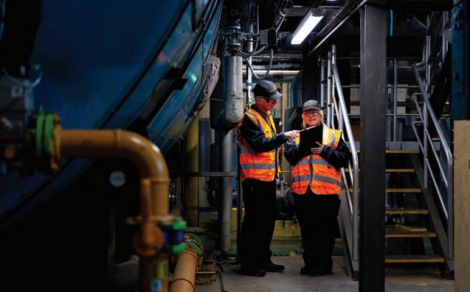Why smart asset management is no longer optional

Moving to a smarter model
A smart asset management strategy puts data and engineering intelligence at its core. The goal is to answer key questions with clarity:
What do I own?
What condition is it in?
What’s the impact if it fails?
What’s the most effective maintenance or replacement plan?
It starts by building a digital asset register, populated with sufficient data attributes, consolidating data from across the estate into a single, secure source of truth. From there, organisations can apply modelling, predictive analytics and lifecycle insights to shift from, for example, time-based to condition-based or business Focused maintenance.
A great example of this approach in action is our work with a global energy tech company which faced the challenge of managing real estate performance across five countries and 11 unstandardised data sources.
By consolidating this into EMCOR UK’s One Data World platform, the customer gained a single source of truth for asset performance, compliance, and cost tracking. Key results included £500k in guaranteed annual savings, a 98% compliance rating, over 100 users collaborating across UK and European sites, and more than 30 efficiency and compliance improvements identified.
This kind of transformation doesn’t require starting from scratch - it just needs a clear strategy, the right expertise, and scalable tools.
Getting started: Building the foundations
For engineering leaders wondering where to begin, the following steps are a good starting point:
1. Assess what you know: Conduct a gap analysis of your current asset data, systems and maintenance practices.
2. Define criticality: Identify which assets have the biggest impact on operations, safety or compliance. Where are the Single Points of Failure (SPoF)?
3. Align your goals: Link your asset strategy to broader objectives - such as reducing energy use, increasing uptime, or preparing for ESG audits.
4. Consolidate data: Where possible, centralise asset information into one system - even if it starts with spreadsheets. Clean data is the foundation.
5. Start small, scale fast: Begin with one site or asset type and demonstrate early value to secure wider buy-in.
Making the case for investment
Alongside cultural change (a separate albeit related subject), one of the most common barriers to change is cost. However, the return on investment of smart asset management is measurable and often quick to materialise. Avoiding downtime alone can prevent tens or even hundreds of thousands of pounds in lost production. Optimising asset performance leads to significant energy savings, particularly when high-consumption equipment is replaced or operated more efficiently.
Maintenance spend also becomes more targeted and predictable, reducing unplanned interventions and increasing team efficiency. And from a compliance perspective, having auditable, standardised reports in place supports regulatory requirements and reduces the risk of fines or reputational damage.
When combined, these benefits can outweigh the cost of system implementation.
Smart doesn’t have to mean new
There’s a common misconception that becoming “smart” means starting from scratch with new systems and equipment. In fact, many of the most successful transformations we’ve supported have involved a review of maintenance delivery strategies following points one to five above. The analysis of asset and maintenance strategies often identify excessive or overlapping maintenance regimes which, for non-business critical assets, provides the opportunity to adjust discretionary maintenance activities, saving time and money and allowing the more effective deployment of technical resource elsewhere within the business. Other examples involved retrofitting sensors to existing infrastructure or integrating legacy CAFM or BMS platforms into a single data environment. This approach allows organisations to modernise at their own pace, protect past investments, and prove value early - without disruption.
-
SMART Manufacturing & Engineering Week
04 - 05 June, 2025
NEC, Birmingham UK -
PPMA 2025
23 September, 2025, 9:30 - 25 September, 2025, 16:00
NEC, Birmingham UK -
Advanced Engineering Show 2025
29 October, 2025, 9:00 - 30 October, 2025, 16:00
NEC, Birmingham UK










